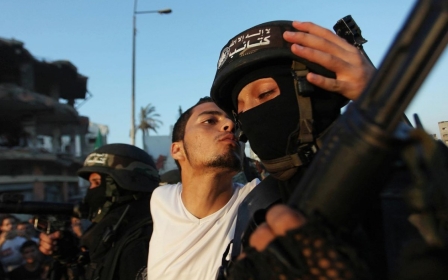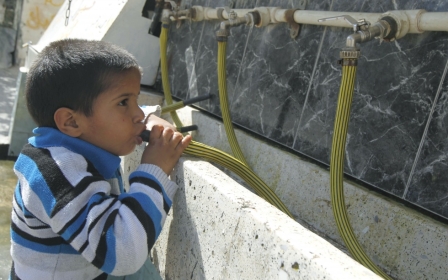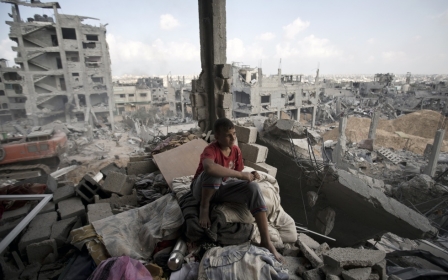Security Council resolutions and compromised ceasefires

A trend of drafting outlines for a possible UN Security Council resolution with regard to Gaza seemed to be gaining momentum. As Israeli President Benjamin Netanyahu declared his intention to prolong “Protective Edge” just a few hours prior to the announcement of the ceasefire, the UK, France, Germany and Jordan supplied their own schemes for an alleged ceasefire. The latest addition to the concoction is a draft from the US which, according to the Jerusalem Post’s quoting of an unnamed UN diplomat, is “quite different from the two others. Now they’re working to combine the drafts and come up with a common text.”
Combining the texts will hardly prove to be a severe diplomatic exercise, considering the authors are already confirmed perpetrators and collaborators in Palestinian oppression. Jordan’s draft, for example, regurgitates previous conditions which were never honoured by Israel while requesting “intensified international arrangements to prevent arms and ammunition smuggling,” in efforts to destabilise Palestinian resistance.
Despite the inscribed futility, PLO ambassador to the UN, Riyad Mansour allegedly urged for its adaptation, declaring such action as required responsibility on behalf of the UNSC. Eliminated from official discourse, yet intertwined, is the endorsement of Israel’s settler-colonialism as a primary objective to be defended.
According to the Times of Israel, the US’s contribution will provide additional assurances for Israel. Unnamed diplomats have stated that the resolution would address Israel’s perpetual “security concerns,” place restrictions on the Palestinian resistance to prevent coordinated armed struggle, allow overt infiltration of the Palestinian Authority in Gaza and entrust border crossing security to the European Union. Hamas is reduced to a spectre hovering in the background, in concordance with plans to divest the resistance movement of its centrality to Palestinian liberation.
Meanwhile, UN Secretary General, Ban Ki-Moon has placed an ultimatum upon international aid in rebuilding Gaza, stating that such forthcoming aid is available “for the last time.” Such threats are of additional satisfaction to Israel’s plans for colonial expansion - a guarantee that further aggression and its ramifications will facilitate further expulsion and displacement of Palestinians who had managed to escape Israel’s macabre bombing assaults, without any semblance of incrimination from the allied international community.
Tuesday’s declared ceasefire, based upon Egyptian mediation and the truce reached following Operation Pillar of Defence in 2012, has been welcomed, despite the predictable consequences for Palestinians. According to Ma’an news agency, PA President Mahmoud Abbas announced the ceasefire with words of praise for Palestine’s committed adversaries - Egypt and the US. “We confirm complete appreciation to the Egyptian efforts which started long ago seeking to satisfy all sides. We also would like to mention that (US Secretary of state John) Kerry was also in touch with us for the same purpose and so we thank all those who played roles.”
Abbas’s statement is in perfect synchronisation with imperialist dictates of impunity. Temporary respite may prove beneficial to Palestinians in the enclave. However, a ceasefire that regurgitates previously broken agreements as an innovative concoction of promises indicates another severe compromise with brutal repercussions for Gaza. If acquiescence to the political ramifications of the ceasefire is accepted by the Palestinian resistance, a reinvention of victory might be necessary - one that makes a proper distinction between transient euphoria and long-term strategy. Understandably, the protection of Gaza’s civilians remains a priority for Hamas. However, the current jubilation must be taken within the whole context of concessions that have bequeathed Gaza with a sliver of rights in return for additional surveillance by Israel and its accomplices.
As Abbas has indicated, Egypt’s role in brokering the ceasefire was of paramount importance - hence the probability of applying the terms enshrined within its previously published clauses that relegated Hamas to the side-lines in favour of international interference. Decisions on political interlocutors, the reconstruction of Gaza and required material, as well as border security, will be entrusted to entities hostile not only to the concept of Palestinian resistance, but also to renewed efforts in order to further liberation.
So far, Abbas is simply expressing gratitude through the usual simplifications of the coloniser and the colonised as “sides,” and imperialist interference as “roles” - convenient terminology that undermines the correlation between humanitarian aid and human rights abuses. Gaza, on the other hand, becomes an appended abstract mired in humanitarian rhetoric disassociated from the ramifications of Israel’s intended colonial expansion.
Taking into consideration the aspect of perpetual impunity granted to Israel not only by the international community, but also by Abbas and his reluctance, or inability, to pursue the ICC option departing from the Palestinian narrative, the ceasefire’s implementation upon such compromised terms will temporarily alleviate suffering, but render Palestinians further subjugated to imperialist dictates.
Abbas has clarified his permanent political concession. Hamas, on the other hand, still retains vestiges of ambiguity, which render an analysis of victory or defeat more problematic and dependent upon outcomes beyond the immediate concerns of restructuring. Israel will, predictably, revert to its decades of colonial massacres, land appropriation and forced displacement of Palestinians - at which point the alleged victory will dwindle into recognisable restrictions, humiliation and the next episode of slow extermination targeting the indigenous population.
- Ramona Wadi is an independent researcher, freelance journalist, book reviewer and blogger based in Malta, focusing on the struggle for memory in Palestine and Chile, anti-imperialism, indigenous resistance and the ramifications of settler-colonialism. She is a regular writer for Middle East Monitor and Mint Press News. Her work has been published in various outlets, including academic publications, and translated into several languages
The views expressed in this article belong to the author and do not necessarily reflect the editorial policy of Middle East Eye.
Photo: Palestinian kids make victory sign as Ismail Haniyeh, the second-in-command of Palestinian resistance faction Hamas, makes a speech in Gaza City on 27 August (AA)
New MEE newsletter: Jerusalem Dispatch
Sign up to get the latest insights and analysis on Israel-Palestine, alongside Turkey Unpacked and other MEE newsletters
Middle East Eye delivers independent and unrivalled coverage and analysis of the Middle East, North Africa and beyond. To learn more about republishing this content and the associated fees, please fill out this form. More about MEE can be found here.





